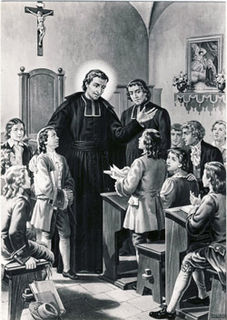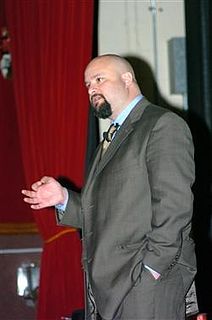A Quote by Pope Francis
In the roughest moments, remember: God is our Father; God does not abandon his children.
Related Quotes
'Go to My brethren, and say unto them, I ascend unto My Father, and your Father, and to My God, and your God' (Jn. 20:!7). He is our Father by grace through the Spirit of adoption (Rom. 8:15), but His Father by nature on account of His divinity. Similarly, He is our God as the creator of our human nature, but His God by reason of the dispensation whereby He became man. He made these distinctions so that we might understand the difference.
Why pray? Evidently, God likes to be asked. God certainly does not need our wisdom or our knowledge, nor even the information contained in our prayers ("your Father knows what you need before you ask him"). But by inviting us into the partnership of creation, God also invites us into relationship. God is love, said the apostle John. God does not merely have love or feel love. God is love and cannot not love. As such, God yearns for relationship with the creatures made in his image.
To Whom does our God say, 'in our image' (Gen. 1:26), to whom if it is not to Him who is 'the brightness of His glory and the express image of His Person' (Heb. 1:3), 'the image of the invisible God' (Col. 1:15)? It is then to His living image, to Him Who has said 'I and My Father are one' (Jn. 10:30), 'He who has seen Me has seen the Father' (Jn. 14:9), that God says, 'Let us make man in our image'.
One key and defining attribute of God that does not appear in any other world religion or system is the biblical use of the term "Father." Over 70 times in the New Testament alone, God is described as "Father" to His children. No major world religion describes the relationship between its creator and its adherents in terms of a father.
Our Father in Heaven loves all of His children and desires that they know and understand His plan of happiness. Therefore, He calls prophets, those who have been ordained with power and authority to act in God’s name for the salvation of His children. They are messengers of righteousness, witnesses of Jesus Christ and the infinite power of His Atonement. They hold the keys of the kingdom of God on earth and authorize the performance of saving ordinances.
Why do some persons 'find' God in a way that others do not? Why does God manifest His Presence to some and let multitudes of others struggle along in the half-light of imperfect Christian experience? Of course the will of God is the same for all. He has no favorites within His household. All He has ever done for any of His children He will do for all of His children. The difference lies not with God but with us.
The psychoanalysis of individual human beings, however, teaches us with quite special insistence that the god of each of them is formed in the likeness of his father, that his personal relation to God depends on his relation to his father in the flesh and oscillates and changes along with that relation, and that at bottom God is nothing other than an exalted father.
The peace of God, which surpasses all understanding, will guard your hearts and minds through Christ Jesus . As we do our part rejoice in the Lord, pursue a gentle spirit, pray about everything, and cling to gratitude, God does his part. He bestows upon us the peace of God. Note, this is not a peace from God. Our Father gives us the very peace of God. He downloads the tranquility of the throne room into our world, resulting in an inexplicable calm. We should be worried, but we aren't. We should be upset, but we're comforted.
Someone tells us that God loves us as a father loves his children. We are reassured. But then something awful happens. Some qualification is made.... We are reassured again. But then perhaps we ask: what is this assurance of God's (appropriately qualified) love worth, what is this apparent guarantee really a guarantee against? Just what would have to happen not merely (morally and wrongly) to tempt but also (logically and rightly) to entitle us to say "God does not love us" or even "God does not exist"?
We Gentiles owe our life to Israel. It is Israel who has brought us the message that God is one, and that God is a just and righteous God, and demands righteousness of his children, and demands nothing else. It is Israel who has brought us the message that God is our Father. It is Israel who, in bringing us the divine law, has laid the foundation of liberty.
There were certain great principles involved in the organization of this earth, and one was that there might be a place provided whereon the children of our Heavenly Father could live and propagate their species and have bodies formed for the spirits to inhabit who were the children of God; for . . . He is the God and Father of the spirits of all flesh.



































